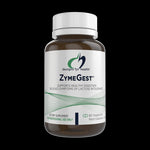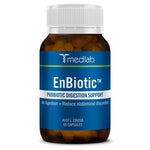
Enzymes Unveiled: How Digestive Enzymes Assist in Alleviating Constipation

I am going to talk about a crucial yet often overlooked aspect of gut health: digestive enzymes. As we commemorate Constipation Awareness Month, let's uncover the remarkable role these enzymes play in supporting digestive health, particularly in combating constipation.
Understanding Digestive Enzymes
Digestive enzymes are the unsung heroes in our bodies, responsible for breaking down food into nutrients that our bodies can absorb and utilise. Produced by various organs including the pancreas, stomach, and small intestine, these enzymes work synergistically to facilitate digestion.
The Link Between Enzymes and Constipation
When discussing constipation, inadequate enzyme production or imbalance can be a contributing factor. Insufficient enzymes may lead to incomplete digestion, causing food to move sluggishly through the digestive tract, resulting in constipation.
Enzymes: The Gut's Helping Hand
So, how can digestive enzymes aid in alleviating constipation?
- Enhanced Digestion: Enzyme supplements can assist in breaking down food more effectively, promoting smoother digestion and bowel movements.
- Support for Specific Foods: Some individuals may struggle with digesting certain foods, such as fats or proteins. Enzyme supplements tailored to these components can offer relief.
- Balancing Gut Microbiota: Enzymes contribute to a healthy gut environment, fostering the growth of beneficial bacteria essential for overall digestive wellness.
- Reduced Bloating and Discomfort: Improved digestion often translates to reduced bloating and discomfort, common symptoms accompanying constipation.
Utilising Enzymes for Gut Harmony
Consider incorporating these strategies to support your gut health with digestive enzymes:
- Enzyme-Rich Foods: Opt for natural enzyme sources such as: pineapples, papayas, mangoes, honey, bananas, avocados, kefir, sauerkraut, kimchi, miso, kiwifruit and ginger.
- Supplements: Enzyme supplements, especially those containing protease, lipase, and amylase, can aid in better digestion. However, consult a healthcare provider before starting any new supplement regimen.
- Balanced Meals and Consistent Habits: Pair enzyme-rich foods with balanced meals and establish consistent eating habits to optimise enzyme function.
Consultation and Caution
Before introducing new supplements or drastically altering your diet, it's crucial to seek advice from a healthcare professional or a qualified naturopath. They can assess your individual needs and guide you towards the most suitable enzyme regimen.
As we commemorate Constipation Awareness Month, let's acknowledge the significant role of digestive enzymes in maintaining gut health. Embracing these enzymes as allies in our journey toward digestive wellness can pave the way for a happier, healthier gut.
Here's to a season of celebrating gut harmony and supporting our bodies from the inside out!
By Lisa Barry
References
Ianiro, G., Pecere, S., Giorgio, V., Gasbarrini, A., & Cammarota, G. (2016). Digestive Enzyme Supplementation in Gastrointestinal Diseases. Current drug metabolism, 17(2), 187–193.
Bellini, M., Tonarelli, S., Barracca, F., Rettura, F., Pancetti, A., Ceccarelli, L., Ricchiuti, A., Costa, F., de Bortoli, N., Marchi, S., & Rossi, A. (2021). Chronic Constipation: Is a Nutritional Approach Reasonable?. Nutrients, 13(10), 3386.







